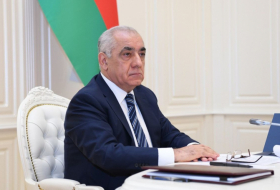‘Turkmenistan sits on the Supervisory Board of the Organization of Turkic States, which has recently adopted the Vision 2040 document. It also encompasses cooperation on energy and green energy, said Ramil Huseyn, Deputy Executive Director of the Centre for Analysis of Economic Reforms and Communication (CAERC) in his interview with AzVision.az.
He noted that Azerbaijan’s potential for green energy has not yet been accurately assessed. We know that 157 gigawatts of our technical potential of 184 GW are in the Caspian Sea, 35 GW of which is in the shallow waters. It is more convenient to use. The rest is in the deeper waters, which we can use in the future.
‘At the same time, we have a potential of 27 gigawatts on land. We are hard at work towards putting this potential to use. Azerbaijan has already signed agreements and contracts to utilize 25. This will both meet the domestic demand and be exported.
As for neighbouring Turkmenistan, it is a much larger country than Azerbaijan. Deserts make up around 70% of the entire country. Although they are unsuitable for agriculture and other fields, they offer great potential for solar energy.
Being located on the coast of the Caspian Sea also opens opportunities for wind energy. Nevertheless, they are a few steps behind us. UAE’s Masdar Clean Energy, which invested in Azerbaijan, will now produce green energy in Turkmenistan. This means the same company is now investing in both Azerbaijan and Turkmenistan in green energy. This can bring our cooperation even closer.
Turkmenistan is also working with a Turkish company towards its goals, albeit not too significantly. Turkmenistan produces gas, which is much cheaper to convert into energy. And the country only has a population of some 6 million and the domestic demand is not that substantial. Producing, pipelining and transmitting green energy is in fact quite an expensive endeavour currently. However, Turkmenistan has great potential, because not only 70% of its territories is suitable for the purpose, but it also enjoys 300 days of sun per year. We are already aware of our potential, as we have calculated it. Turkmenistan, on the other hand, is only starting and attracting initial investment in the field. We will see the more accurate landscape of its capabilities in the future.’
- Azerbaijan, Georgia, Romania, and Hungary have recently signed a cooperation protocol on building a deep water high-voltage power line in the Black Sea. Is it possible that Turkmenistan will join the project further down the line?
‘The potential of the current project is 4 GW. The preliminary agreements Azerbaijan has signed on green energy envisage producing up to 25 GW, which is why we are considering new projects. You are probably aware of the ideas and proposals on another green energy corridor project that will run through the Zangazur Corridor in Azerbaijan to Nakhchivan and Turkey and there to Europe. The Cabinet of Ministers has even adopted an action plan on the matter.
There are currently no discussions about whether Turkmenistan will join the existing projects. But we might see ideas around the possible contribution they might make to the field soon. This also poses certain questions. First, is Turkmenistan interested in investing in green energy? Second, how interested are foreign investors in producing green energy in Turkmenistan?
Azerbaijan has much closer access to European markets than Turkmenistan. The countries that are in proximity to them will not be engrossed in the idea of buying this energy. So, the question is ‘If there are investments, will they be able to sell the produced energy?’ In this regard producing gas costs much cheaper than tapping into the green potential in Turkmenistan. It also has a lower demand due to a smaller population. China is already the biggest investor in the field. Overall, both China and South Korea are implementing mega projects in this direction.
Turkmenistan might also benefit from Azerbaijan’s experience. There were no talks about Azerbaijan ever exporting green energy to Europe some 5 years ago. Turkmenistan also has another alternative – producing and selling ‘green hydrogen’, which there is great demand for in the European markets.’
- How much does the project justify itself in terms of profitability and technical demand?
‘The green energy projects are costly. However, the costs have fallen dramatically in the last 15 years. The further advancement of technology will probably reduce the costs some more. Azerbaijan will gain excellent experience by participating in the Black Sea power line project. This may change the situation completely. Projects that seem unprofitable to many today may turn out to be the contrary as time ripens. When we were installing the ‘Baku-Tbilisi-Ceyhan’ pipeline, many deemed it fruitless, whereas time set everything right. Most call our beginnings in green energy costly, but time will show that the entire world is moving in that direction.
Azerbaijan has a potential of about 10 gigawatts in the liberated territories. We will be able to meet our demand at the expense of green energy by 2025. 4 giant companies are coming to the country besides Masdar. BP will invest in green energy here. The wheel is moving. The enterprises founded last year will start producing late this year or next year, thus increasing Azerbaijan’s share in green energy.
One of Azerbaijan’s goals for the socio-economic development strategy is to boost the share of green energy in the total production capacity to 24% by 2024 and bring that number up to 30% by 2030. This also plays a crucial role in meeting our carbon emission commitment.’
- Can Turkmenistan benefit from Azerbaijan’s transit opportunities?
‘We do not currently have a plan or a strategy for importing green energy. That said, our territories can be employed not only as a transport corridor but also for energy export. This is why we also want to build an energy route through the Zangazur corridor. If any of the neighbouring states join the route in the future, Azerbaijan can certainly show support. This is also beneficial for us: We will certainly earn if our territory is used for transit.
Switching to green energy will produce enormous socio-economic, ecological, and social benefits for Azerbaijan. The ecological side is clear. Socially, it will create great employment opportunities. Around 13 million people work in this field and according to forecasts, it will be the busiest field in the future. Producing, storing, and transmitting this energy means new jobs. South Korea enforced a massive 8-GW project on offshore wind energy, thus producing 120 thousand of jobs. Turkmenistan also has great potential to solve the employment problem.
At the same time, green energy will expand our non-oil exports, which Turkmenistan is also in need of. Although Turkmenistan is a small country, it must have a vision. It can command efforts towards green energy, thus employing its gas elsewhere in the industry. Turkmenistan has intensified cooperation with the Organization of Turkic States. It must become a full-fledged member to benefit from all opportunities, including Azerbaijan’s experience.
As a matter of fact, Turkmenistan may be the one that benefits the most from amplifying cooperation with Azerbaijan. There are solid measures for the implementation of the development concept for the Turkic states by 2040. This envisages cooperation on technology, energy, and transport corridors. For example, there is an obligation regarding the joint promotion of the Zangazur Corridor. At the same time, Azerbaijan does not want it to be a mere highway corridor, we want energy lines to pass through it. Turkmenistan can also take advantage of these opportunities as a neighbouring country. The costs for energy transmission will also probably decrease soon. Technology is growing gallopingly. The costs for green energy plummeted in 2020 compared to what they were in 2010.’
- If these projects do in fact become a reality, how will they affect transnational relations and geopolitical processes in the region?
‘Azerbaijani companies can gain more experience, which will allow them to produce green energy and invest in Turkmenistan. This is also one of the possible options for the future, just as SOCAR invests in Turkey and sets up shops there. Perhaps Azerbaijani companies will also benefit from the green energy potential in Turkmenistan and Kazakhstan, produce there and cover the needs of those countries.
The construction of these corridors serves peace and strengthens cooperation. The countries are getting closer to each other economically. We are bringing Turkey closer to Turkmenistan. The issues discussed today will contribute greatly to the future. Our goals for 2040 embrace a wide variety, from tourism to culture. Azerbaijan has also put forward its vision for the future and for green energy. A line is installed in the Black Sea, connecting us to Europe, making it a corridor of peace as well. Countries will also grow more interested in peace in the region for sustainable operation of the line. Employing the Zangazur corridor creates another line for peace so that there is no war in the region. Everyone benefits from that. Even Armenia, which currently has territorial claims against us, can benefit from Azerbaijan’s great projects.
The leadership of Turkmenistan should pursue a policy of rapprochement, not self-isolation. This is crucial for the development of the country, its future, and the situation in the region. Some of Turkmenistan’s neighbours have even set their sights on their lands. The Organization of Turkic States is an establishment that protects its members. The deepening of relations will also be the guarantor of Turkmenistan’s independence.
Sahil Isgandarov
More about:











-1741945056.jpg&h=190&w=280&zc=1&q=100)























-1741945056.jpg&h=120&w=187&zc=1&q=70')
-1741856732.jpg&h=120&w=187&zc=1&q=70')











